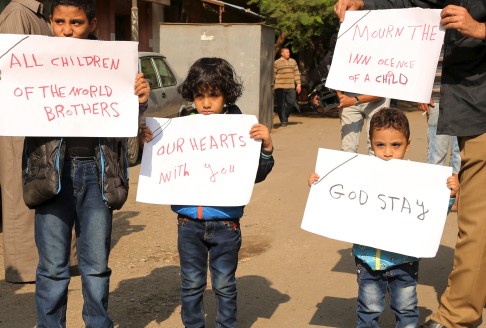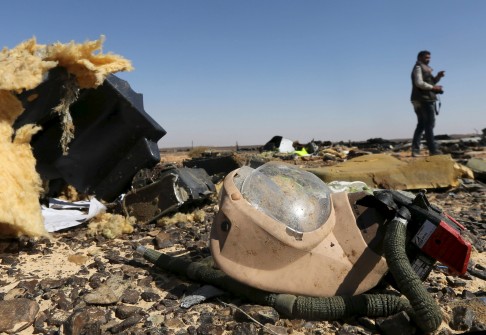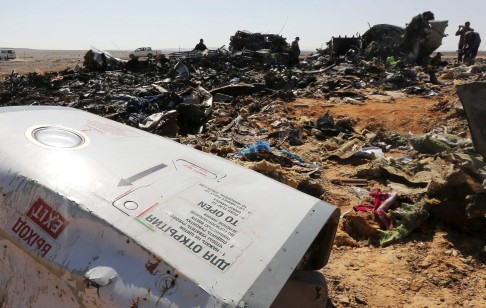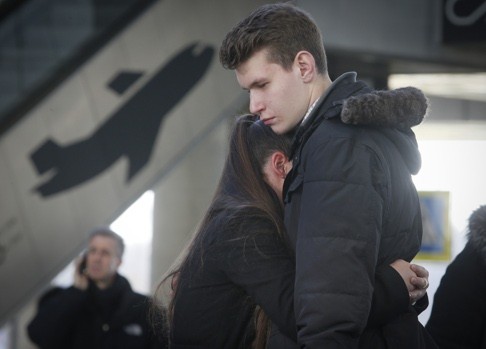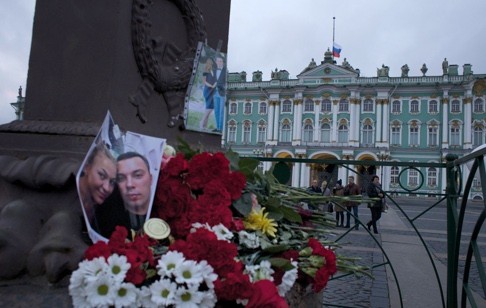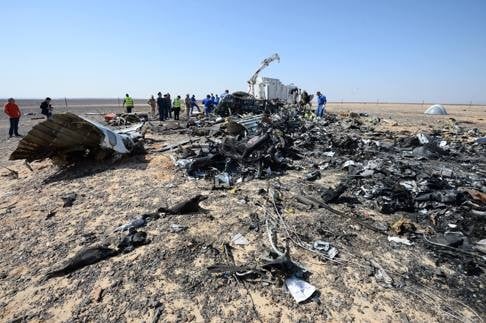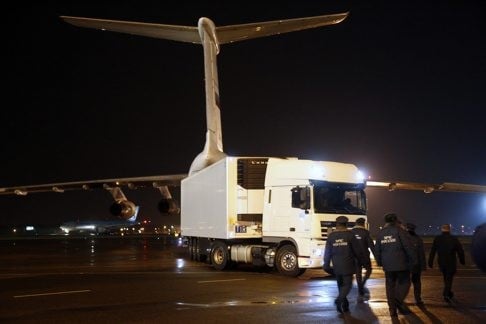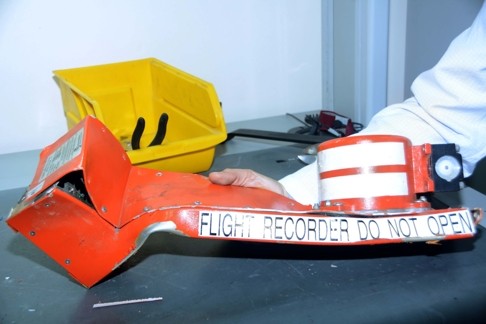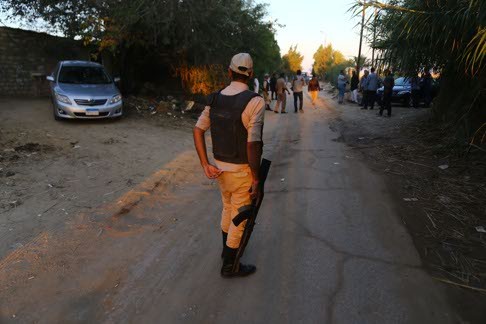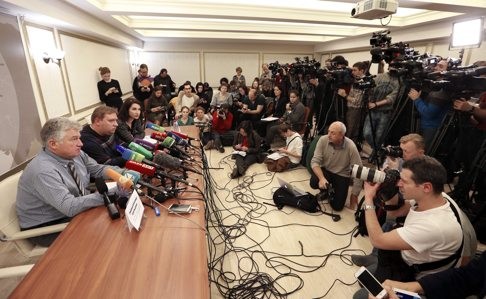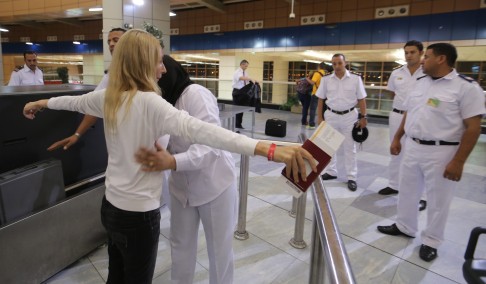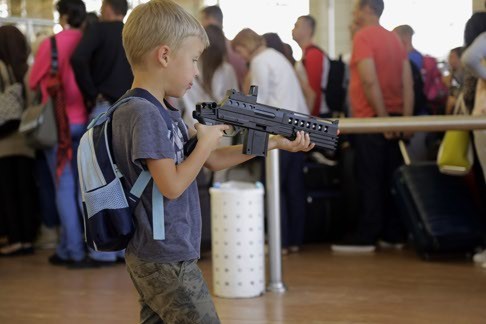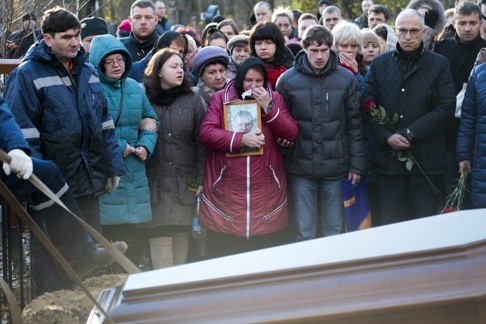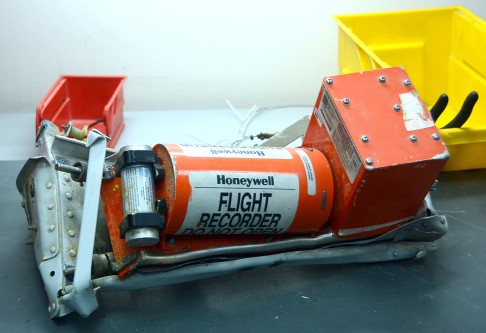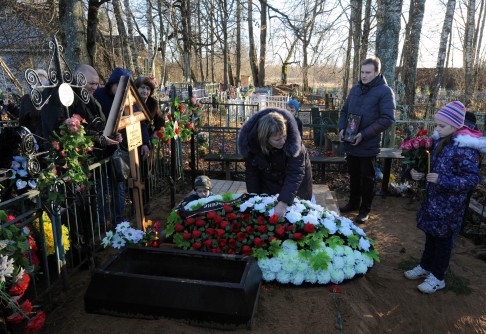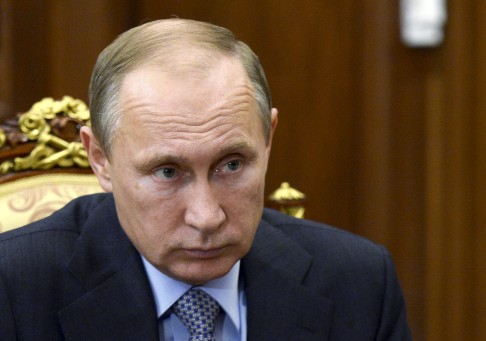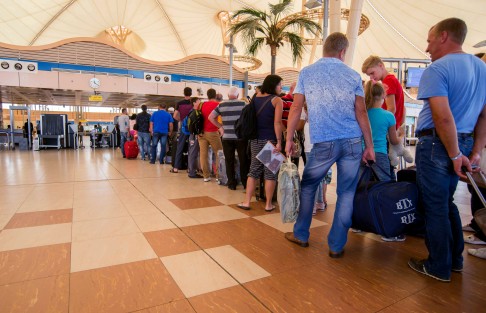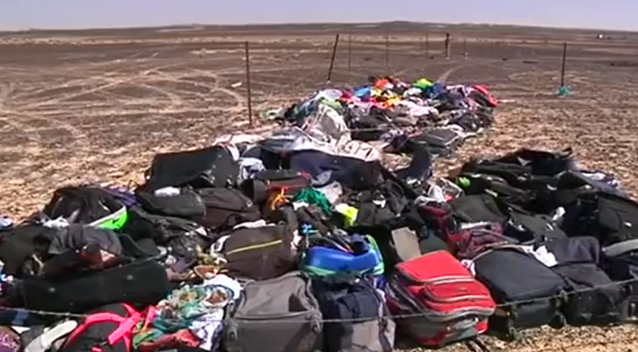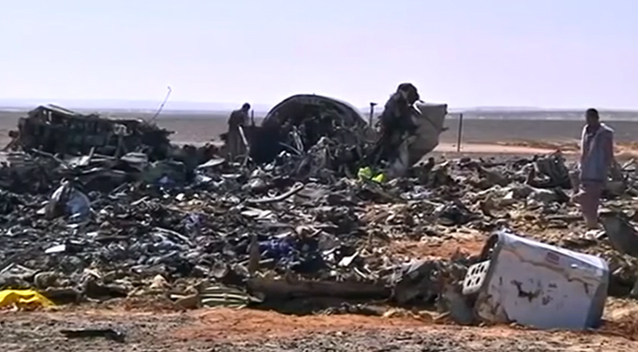[video=youtube_share;LUU5hwL4gVI]https://youtu.be/LUU5hwL4gVI[/video]
No survivors in 'tragic scene': A Russian Airliner crashes into Sinai killing all 224 people on board
The plane disappeared from radar screens earlier this morning, 20 minutes after taking off from Sharm el-Sheikh headed for St Petersburg with 138 women, 62 men and 17 children.
PUBLISHED : Saturday, 31 October, 2015, 4:19pm
UPDATED : Saturday, 31 October, 2015, 11:30pm
Agencies

Relatives of passengers of Kogalymavia 9268 weep at Pulkovo II international airport in St. Petersburg, Russia. Photo: EPA
Several Egyptian military and security officials say there are no survivors from the Russian passenger plane carrying 224 people that crashed into Egypt’s Sinai Peninsula.
The officials all spoke to The Associated Press on condition of anonymity because they were not authorized to brief the media. Aviation experts have reached the crash site near the city of el-Arish.
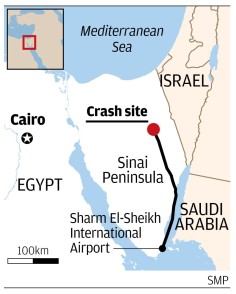
Out of the total 217 passengers, 138 were women, 62 men and 17 were children, said the Egyptian cabinet said in a statement.
They also said the plane was carrying 214 Russian passengers and three Ukrainians.
Reuters earlier reported Egyptian authorities have located the plane's black box.
The Kogalymavia Russian airline took off from Sharm el-Sheikh, a popular Red Sea destination for Russian tourists, at 5.51am (Cairo time) and was bound for St. Petersburg, said Sergei Lzvolsky, an official with the Russian aviation agency Rosaviatsia to Interfax news agency.
The ministry said earlier today it had lost contact with a Russian aircraft 23 minutes after takeoff when it disappeared from radar screens.
Russian President Vladimir Putin expresses his deepest condolences to the families of victims of the crash of a Russian airliner in Egypt, Russian news agencies reported today citing the Kremlin press service.
He also ordered government ministries to offer immediate assistance to relatives of those killed and is sending Russian rescue teams to the site.
An Egyptian aviation official says the pilot of the Russian airliner that crashed in the Sinai Peninsula had reported technical difficulties before losing contact with air traffic controllers.
Ayman al-Muqadem, a member of the Aviation Incidents Committee, said the pilot had reported his intention to attempt to land at the nearest airport.
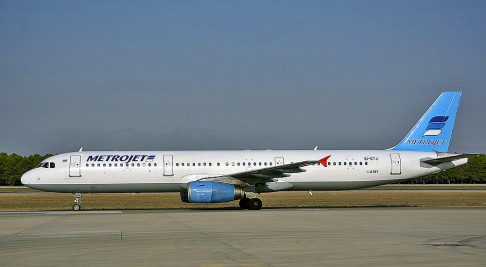
The Airbus A-321, operated by Russian airline Kogalymavia under the brand Metrojet was registered with the flight number 7K9268. The Metrojet's Airbus A-321 is seen in this picture taken in Antalya in September. Photo: Reuters
The Airbus A-321, operated by Russian airline Kogalymavia, also known as Kolavia, an airline carrying out charter flights for tourism operators, and operating under the brand Metrojet and registered as 7K9268.
The charter flight was booked by Moscow-based tourist firm Brisco, a representative of the firm told AFP.
At Saint Petersburg’s Pulkovo airport, anxious family members awaited news of their loved ones.
“I am meeting my parents,” said 25-year-old Ella Smirnova, a tall young woman seemingly in shock. “I spoke to them last on the phone when they were already on the plane, and then I heard the news.”
“I will keep hoping until the end that they are alive, but perhaps I will never see them again.”
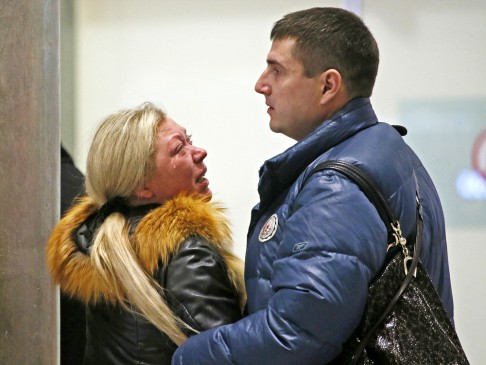
Most of the passengers are believed to be Russian.
"Military planes have discovered the wreckage of the plane ... in a mountainous area, and 45 ambulances have been directed to the site to evacuate dead and wounded,” according to a statement by the country's cabinet.
The security officer at the scene told Reuters by telephone that search and rescue teams heard voices in a section of the plane.
"I now see a tragic scene. A lot of dead on the ground and many who died whilst strapped to their seats," the officer, who requested anonymity, said.
"The plane split into two, a small part on the tail end that burned and a larger part that crashed into a rock. We have extracted at least 100 bodies and the rest are still inside."
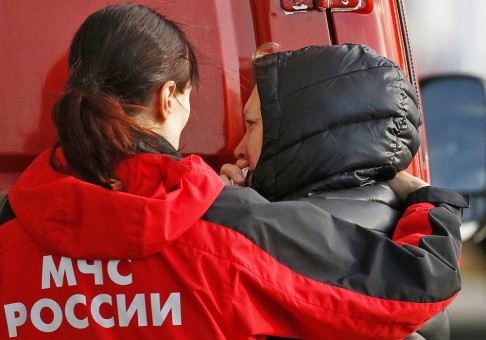
Russian Emergency doctor comforts a relative of a passenger aboard the crashed Russian airlineras people gather at Pulkovo airport in St.Petersburg, Russia. Photo: AP
Russia’s Investigative Committee has launched a criminal case against airline Kogalymavia under an article regulating "violation of rules of flights and preparations for them", Russian news agencies said, citing the committee’s spokesman.
A standard procedure for air crashes involving Russian planes, the committee is also sending investigators to the scene.
There are no indications the aircraft was shot down, Egyptian security sources said.
Egypt’s North Sinai is home to a two-year-old Islamist insurgency and militants affiliated to Islamic State have killed hundreds of soldiers and police.
Other media reported that the same airline experienced another crash in January 2011 when a fire broke out on one of the engines of a Tupolev Tu-154B-2 before taxiing.
No survivors in 'tragic scene': A Russian Airliner crashes into Sinai killing all 224 people on board
The plane disappeared from radar screens earlier this morning, 20 minutes after taking off from Sharm el-Sheikh headed for St Petersburg with 138 women, 62 men and 17 children.
PUBLISHED : Saturday, 31 October, 2015, 4:19pm
UPDATED : Saturday, 31 October, 2015, 11:30pm
Agencies

Relatives of passengers of Kogalymavia 9268 weep at Pulkovo II international airport in St. Petersburg, Russia. Photo: EPA
Several Egyptian military and security officials say there are no survivors from the Russian passenger plane carrying 224 people that crashed into Egypt’s Sinai Peninsula.
The officials all spoke to The Associated Press on condition of anonymity because they were not authorized to brief the media. Aviation experts have reached the crash site near the city of el-Arish.

Out of the total 217 passengers, 138 were women, 62 men and 17 were children, said the Egyptian cabinet said in a statement.
They also said the plane was carrying 214 Russian passengers and three Ukrainians.
Reuters earlier reported Egyptian authorities have located the plane's black box.
The Kogalymavia Russian airline took off from Sharm el-Sheikh, a popular Red Sea destination for Russian tourists, at 5.51am (Cairo time) and was bound for St. Petersburg, said Sergei Lzvolsky, an official with the Russian aviation agency Rosaviatsia to Interfax news agency.
The ministry said earlier today it had lost contact with a Russian aircraft 23 minutes after takeoff when it disappeared from radar screens.
Russian President Vladimir Putin expresses his deepest condolences to the families of victims of the crash of a Russian airliner in Egypt, Russian news agencies reported today citing the Kremlin press service.
He also ordered government ministries to offer immediate assistance to relatives of those killed and is sending Russian rescue teams to the site.
An Egyptian aviation official says the pilot of the Russian airliner that crashed in the Sinai Peninsula had reported technical difficulties before losing contact with air traffic controllers.
Ayman al-Muqadem, a member of the Aviation Incidents Committee, said the pilot had reported his intention to attempt to land at the nearest airport.

The Airbus A-321, operated by Russian airline Kogalymavia under the brand Metrojet was registered with the flight number 7K9268. The Metrojet's Airbus A-321 is seen in this picture taken in Antalya in September. Photo: Reuters
The Airbus A-321, operated by Russian airline Kogalymavia, also known as Kolavia, an airline carrying out charter flights for tourism operators, and operating under the brand Metrojet and registered as 7K9268.
The charter flight was booked by Moscow-based tourist firm Brisco, a representative of the firm told AFP.
At Saint Petersburg’s Pulkovo airport, anxious family members awaited news of their loved ones.
“I am meeting my parents,” said 25-year-old Ella Smirnova, a tall young woman seemingly in shock. “I spoke to them last on the phone when they were already on the plane, and then I heard the news.”
“I will keep hoping until the end that they are alive, but perhaps I will never see them again.”

Most of the passengers are believed to be Russian.
"Military planes have discovered the wreckage of the plane ... in a mountainous area, and 45 ambulances have been directed to the site to evacuate dead and wounded,” according to a statement by the country's cabinet.
The security officer at the scene told Reuters by telephone that search and rescue teams heard voices in a section of the plane.
"I now see a tragic scene. A lot of dead on the ground and many who died whilst strapped to their seats," the officer, who requested anonymity, said.
"The plane split into two, a small part on the tail end that burned and a larger part that crashed into a rock. We have extracted at least 100 bodies and the rest are still inside."

Russian Emergency doctor comforts a relative of a passenger aboard the crashed Russian airlineras people gather at Pulkovo airport in St.Petersburg, Russia. Photo: AP
Russia’s Investigative Committee has launched a criminal case against airline Kogalymavia under an article regulating "violation of rules of flights and preparations for them", Russian news agencies said, citing the committee’s spokesman.
A standard procedure for air crashes involving Russian planes, the committee is also sending investigators to the scene.
There are no indications the aircraft was shot down, Egyptian security sources said.
Egypt’s North Sinai is home to a two-year-old Islamist insurgency and militants affiliated to Islamic State have killed hundreds of soldiers and police.
Other media reported that the same airline experienced another crash in January 2011 when a fire broke out on one of the engines of a Tupolev Tu-154B-2 before taxiing.


